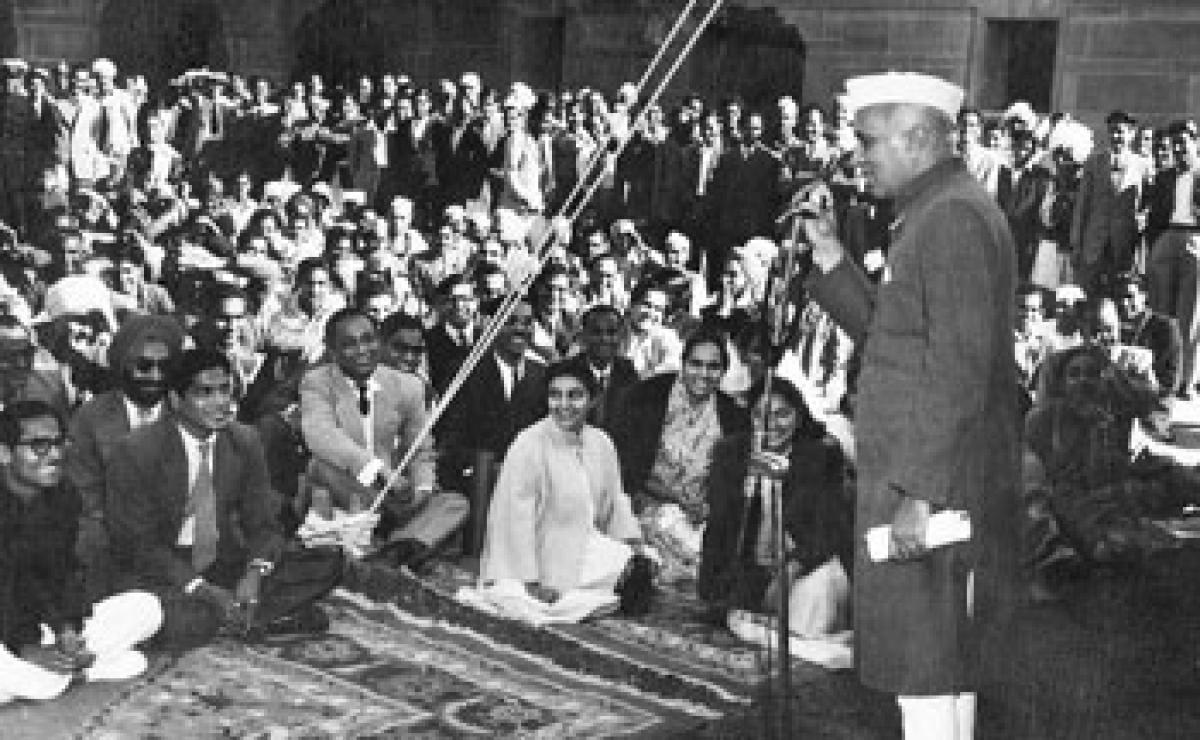Live
- G20 Leaders Will Talk About Climate, Taxes, and Trump's Return in Brazil
- COP29: CDRI announces $8 million funding for 12 projects to address climate crisis
- Anti-Telgu remarks: Actor Kasthuri Shankar moves court for bail
- Samsung AR Smart Glasses Set to Launch in 2025, Featuring Ray-Ban Meta-Like Design
- Kerala Industries Minister confident that new policy will boost plantation sector
- Madras HC plans inter-departmental monitoring committee to combat drug use in TN
- Bihar: Spotted deer dies due to heart attack in Banka district
- Mushtaq Ali T20: Shami to spearhead Bengal bowling attack, Gharami named captain
- Kharge's clarion call to oust Maharashtra's BJP-backed MahaYuti
- Why Ukraine’s Use of US Missiles Against Russia Could Lead to World War 3
Just In

The establishment of full Parliamentary Democracy in India was a momentous step in the history of de- coloniasation. Nehru played a central role in shaping the process by which limited representative government given by the British in progressive doses was transformed into vibrant and powerful institutions that suited the genius of the Indian people.
 The establishment of full Parliamentary Democracy in India was a momentous step in the history of de- coloniasation. Nehru played a central role in shaping the process by which limited representative government given by the British in progressive doses was transformed into vibrant and powerful institutions that suited the genius of the Indian people.
The establishment of full Parliamentary Democracy in India was a momentous step in the history of de- coloniasation. Nehru played a central role in shaping the process by which limited representative government given by the British in progressive doses was transformed into vibrant and powerful institutions that suited the genius of the Indian people.
Democracy, for Nehru, meant a responsible and responsive political system governing through consultation and discussion. There was in him what his biographer S. Gopal calls:"a granite core of intellectual and moral commitment to democratic values”.
Moving the ‘Objectives’ Resolution in the Constituent Assembly, Nehru observed, "Whatever system of Government we may establish here must fit in with the temper of our people and be acceptable to them”.
Nehru established healthy practices and precedents as Leader of the House in the Provisional Parliament of 1950 and in the First, Second, and Third Lok Sabhas from 1952 to 1964. He treated Parliament with great respect and sat patiently through long and often tedious debates as an example to his colleagues and young parliamentarians.
He spoke frequently in Parliament, and used it as a forum to disseminate his views to the public. Letters from Members of Parliament were invariably replied to personally and promptly. Nehru laid down conventions of lasting value by upholding the Speaker’s position in the House.
Nehru promoted frank discussions on subjects of importance in the Houses of Parliament and did not appreciate the use of public interest as a reason to deny information.
Nehru was aware that the lack of an established opposition meant significant weakness in the system. He said:"I do not want India to be a country in which millions of people say "yes” to one man, I want a strong opposition.”
Most of the time of Parliament Sessions during the first to the third Lok Sabhas were devoted to discussing legislation, budget, plan and matters related to money and finance. The volume of financial transactions in those days was very meagre. But, this did not prevent Members of Parliament from having full debate on various financial issues, especially the Five Year Plans.
Nehru frequently met opposition leaders to exchange ideas on crucial issues and asked his ministers to welcome probing questions and debates.
Nehru took keen interest in the Question Hour and was almost always present during the Hour. Nehru was attentive to the need to preserve and protect the rights and privileges of members. He was also particular that the dignity and prestige of the House should be maintained at all times.
Nehru had tremendous faith in the capacity of poor, unlettered people to understand issues and exercise reasoned choices. He did not use the excuse of the partition of the country and the consequent communal violence or influx of refugees to postpone elections.
On the contrary, he was impatient to go to the people and unhappy that elections could not be held earlier. In the campaign for the first General Elections of 1951-52, Nehru personally travelled some 25,000 miles and addressed around 35 million people or a tenth of India’s then population. He educated the people about the value of adult suffrage and their duty to discharge their right to vote with responsibility.

© 2024 Hyderabad Media House Limited/The Hans India. All rights reserved. Powered by hocalwire.com







